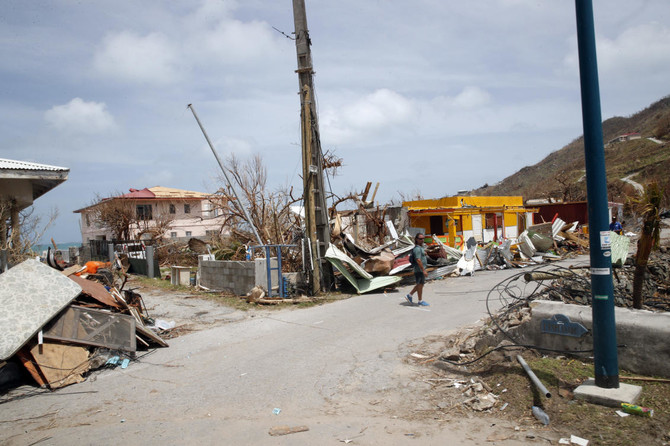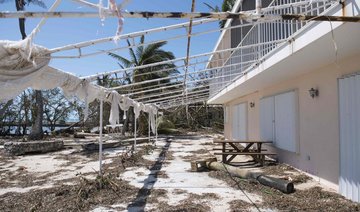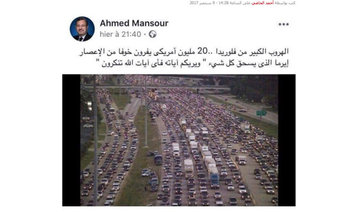MARIGOT, ST. MARTIN: France’s president promised to quickly evacuate residents of his country’s Caribbean territories and provide services and shelter for those who choose to stay, wrapping up a sweeping visit of the destroyed island of St. Martin and responding to anger that his government didn’t do enough to handle Hurricane Irma’s wrath.
French President Emmanuel Macron outlined a plan to distribute drinking water, food and medical help using the islands’ radio stations and even megaphones, if necessary. He also said about half of the island’s mobile connectivity had been restored and all “essential communication” would be back by next week.
“What we have seen today are people determined to rebuild and return to a normal life,” he said Tuesday in a press conference. “They are impatient for answers and some are very, very angry. The anger is legitimate because it is a result of the fear they have faced and of being very fatigued. It is certain that some want to leave, and we will help them in that effort.”
He said France was bringing in air-conditioned tents so children can start classes again soon, and he said a center would be established by Monday to begin processing requests for financial help.
Macron pledged to rebuild St. Martin as a “model” for withstanding future storms.
“I don’t want to rebuild St. Martin as it was,” he said. “We have seen there are many homes that were built too precariously, with fragile infrastructure. The geography of the homes was not adapted to the risks.”
Macron said the Category 5 hurricane killed 11 people in St. Martin, while another four people died on the Dutch side of the island, bringing the death toll in the Caribbean to at least 37.
The visit came as residents tried to revive a sense of normalcy with small gestures like sharing radios and rescuing dogs.
The Dutch Red Cross said more than 200 people were still listed as missing on St. Maarten, but with communications extremely spotty a week after the storm hit, it wasn’t clear how many were simply without cell service and power and unable to let friends and family know they survived. The organization said 90 percent of buildings on the Dutch territory were damaged and a third destroyed as Irma roared across the island it shares with French St. Martin.
Yogesh Bodha, a jewelry store employee, said there was no response from European officials for two days and he hasn’t seen many changes since Dutch authorities arrived on St. Maarten.
“They should’ve been more organized than they were,” he said. “We have not received any food or water. They say it’s on its way. Let’s see.”
For Liseth Echevarría, who works as a bartender in St. Maarten, offering whatever she could to family, strangers and abandoned pets was helping her cope — and those around her were doing the same.
The manager of a marina next door threw over a hose so Echevarría and her husband could have a semblance of an outdoor shower. He also offered them a temporary power connection from his generator so they could charge phones and listen to the sole radio station still broadcasting.
“This is the only communication that St. Maarten has with the world right now,” she said.
It was thanks to that radio station that she found out about a flight for all Latin Americans stuck in St. Maarten. She rushed to the airport with her brother, who was evacuating back to Colombia. As she dropped him off, Echevarría saw a Yorkshire terrier tied to a metal barricade, abandoned by a passenger fleeing the island and told they couldn’t bring pets on the plane.
Echevarría scooped up the dog named Oliver and took him home to meet her three other dogs, including one rescued from a neighbor’s property. The neighbor fled with her son after the hurricane destroyed their home. There was nothing left of it other than jagged pieces of wood and a shower curtain covered in colorful butterflies tangled in a toppled tree.
Echevarría’s husband, Lex Kools, a civil engineer, jumps over the fence every day to feed the other two dogs on the property.
“They were attacking each other, they were so hungry,” he said.
At Echevarria’s and Kools’ home, the couple fed relatives and the girlfriend and two children of Echevarria’s cousin, all of whom were staying with them.
Near the front door, a large plastic table sagged under the weight of boxes of spaghetti and cookies, soup cans, chips, bags of almonds and macadamia nuts and rice. Underneath were dozens of bottles of water.
The couple said they took the goods from a grocery store blown open during the storm.
They said they had planned on buying the items, but no one was working at the store and they were running out of food and water. They looked at each other as they observed looting.
“Do we do this as well?” Kools recalled thinking. “Everybody was just running inside. It was chaos.”
Dozens of people stood in line for hours Tuesday waiting for flights, some of which never materialized.
“We’ve been here since 7 a.m.,” said Rosa Vanderpool, an accountant who was trying to get her stepdaughter and 4-year-old step-granddaughter on a flight to Curacao.
“We only have two days of food left,” she said. “We don’t know if there are any planes. We don’t know anything.”
Europe leaders answer anger over Irma response in Caribbean
Europe leaders answer anger over Irma response in Caribbean

China sanctions 7 companies over US military assistance to Taiwan

- The sanctions also come in response to the recent approval of the US government’s annual defense spending bill
- Any assets they have in China will be frozen, and organizations and individuals in China are prohibited from engaging in any activity with them
The sanctions also come in response to the recent approval of the US government’s annual defense spending bill, which a Chinese Foreign Ministry statement said “includes multiple negative sections on China.”
China objects to American military assistance for Taiwan and often imposes sanctions on related companies after a sale or aid package is announced. The sanctions generally have a limited impact, because American defense companies don’t sell arms or other military goods to China. The US is the main supplier of weapons to Taiwan for its defense.
The seven companies being sanctioned are Insitu Inc., Hudson Technologies Co., Saronic Technologies, Inc., Raytheon Canada, Raytheon Australia, Aerkomm Inc. and Oceaneering International Inc., the Foreign Ministry statement said. It said that “relevant senior executives” of the companies are also sanctioned, without naming any.
Any assets they have in China will be frozen, and organizations and individuals in China are prohibited from engaging in any activity with them, it said.
US President Joe Biden last week authorized up to $571 million in Defense Department material and services and military education and training for Taiwan. Separately, the Defense Department announced that $295 million in military sales had been approved.
The US defense bill boosts military spending to $895 billion and directs resources toward a more confrontational approach to China. It establishes a fund that could be used to send military resources to Taiwan in much the same way that the US has backed Ukraine. It also expands a ban on US military purchases of Chinese products ranging from drone technology to garlic for military commissaries.
Zhang Xiaogang, a Chinese Defense Ministry spokesperson, said earlier this week that the US is hyping up the “so-called” threat from China to justify increased military spending.
“US military spending has topped the world and keeps increasing every year,” he said at a press conference. “This fully exposes the belligerent nature of the US and its obsession with hegemony and expansion.”
The Foreign Ministry statement said the US moves violate agreements between the two countries on Taiwan, interfere in China’s domestic affairs and undermine the nation’s sovereignty and territorial integrity.
Taiwan’s government said earlier this month that China had sent dozens of ships into nearby seas to practice a blockade of the island, a move that Taiwan said undermined peace and stability and disrupted international shipping and trade. China has not confirmed or commented on the reported military activity.
At least 69 migrants killed in shipwreck off Morocco on deadly route to Spain

- The Atlantic migration route from the coast of West Africa to Spain’s Canary Islands has seen a surge this year
BAMAKO/LAS PALMAS, Spain: At least 69 people died after a boat headed from West Africa to the Canary Islands capsized off Morocco on Dec. 19, Malian authorities said, as data showed deaths of migrants attempting to reach Spain surged to an all-time high in 2024.
The makeshift boat was carrying around 80 people when it capsized. Only 11 survived, the Ministry of Malians Abroad said in a statement on Thursday, after collecting information to reconstruct the incident.
A crisis unit has been set up to monitor the situation, it added.
The Atlantic migration route from the coast of West Africa to Spain’s Canary Islands, typically used by African migrants trying to reach mainland Spain, has seen a surge this year, with 41,425 arrivals in January-November already exceeding last year’s record 39,910.
Years of conflict in the Sahel region that includes Mali, unemployment and the impact of climate change on farming communities are among the reasons why people attempt the crossing.
One person died among 300 people who arrived on six boats on Friday on the island of El Hierro in the Canaries, according to the Red Cross.
The Atlantic route, which includes departure points in Senegal and Gambia, Mauritania and Morocco, is the world’s deadliest, according to migrant aid group Walking Borders.
In its annual report released this week, the group said 9,757 migrants died at sea in 2024 trying to reach the Spanish archipelago from Africa’s Atlantic coast. A record 10,457 people — or nearly 30 people a day — died attempting to reach Spain this year from all routes, according to the report.
The route departing from Mauritania, which has been particularly well used this year by migrants leaving the Sahel region, was the deadliest, accounting for 6,829 deaths.
Walking Borders blamed a lack of action or arbitrary rescues and the criminalization of migrants for the surge in deaths at sea, accusing governments of “the prioritization of immigration control over the right to life.”
India declares seven days of mourning for former PM Manmohan Singh

- Singh, widely regarded as the architect of India’s economic reform program, died late on Thursday at age 92
- Officials canceled cultural, entertainment events for the week, national flag flew at half-mast at government buildings
NEW DELHI: Government offices in India lowered the national flag on Friday for a week of mourning for former prime minister Manmohan Singh, whose economic reforms helped transform the country into one of the world’s fastest-growing economies.
The first Sikh to lead the nation, Singh served a rare two terms as prime minister from 2004 to 2014. He passed away on Thursday evening at the age of 92.
The government declared a period of mourning until Jan. 1.
“During this period the National flag will be flown at half-mast throughout India where it is regularly flown and there will be no official entertainment during the period of state mourning,” the Ministry of Home Affairs said.
“It has also been decided that the state funeral will be accorded to late Dr. Manmohan Singh.”
Prime Minister Narendra Modi paid tribute to Singh saying he would be remembered as a “kind-hearted individual, a scholarly economist,” and a leader dedicated to reforms.
“He steered the country out of a financial crisis and paved the way for a new economic direction,” Modi said in a video message.
“His contributions as the prime minister toward the country’s development and progress will always be cherished.”
Born in Gah, now in Pakistan, Singh’s family migrated to India during the partition of the subcontinent in 1947.
He completed his economics degree at the University of Cambridge and earned a doctorate at Oxford with a thesis on the role of exports in India’s economy.
After teaching economics at the University of Punjab, he went to work for the UN Conference on Trade and Development, and later served as economic adviser to the Indian government until he was appointed to head India’s central bank in 1982, and served as finance minister from 1991 to 1996.
In the early 1990s, India faced a deep economic crisis, and Singh played a pivotal role in transitioning the country from a closed economy to a more open, liberalized system. This shift set India on a path of sustained growth for decades.
It was also during his term that India signed a landmark civil nuclear deal with the US, despite not being a signatory to the Nuclear Non-Proliferation Treaty. The deal granted India access to advanced American nuclear technology.
“Manmohan Singh will be remembered for initiating economic reforms and aligning the country with the West. The foreign policy crafted during that phase has been pursued vigorously by Narendra Modi,” Sanjay Kapoor, analyst and political editor, told Arab News.
“Among his major achievements are the raising millions of those living below the poverty line and strengthening democratic institutions.”
Singh was asked to take on the prime minister’s job by Sonia Gandhi, who had led the center-left Congress party to a surprise victory in 2004.
“Manmohan Singh Ji led India with immense wisdom and integrity. His humility and deep understanding of economics inspired the nation,” Congress leader Rahul Gandhi said.
“I have lost a mentor and guide. Millions of us who admired him will remember him with the utmost pride.”
Howe hopes Newcastle have ‘moved on’ in last two seasons

- Newcastle reached the Champions League for the first time in 20 years when they qualified for last season’s competition
- Newcastle slipped to 12th place after a 4-2 defeat at Brentford on December 7, but have since rallied
LONDON: Eddie Howe hopes his current Newcastle team have “moved on” from the one which finished fourth in the Premier League two seasons ago.
The Magpies continued an impressive run of results on Thursday by beating 10-man Aston Villa 3-0 at St. James’ Park — their fourth straight win in all competitions.
Newcastle climbed to fifth in the table and within six points of second-placed Chelsea.
Newcastle reached the Champions League for the first time in 20 years when they qualified for last season’s competition.
“I’d hope we’ve moved on from that team,” Howe said.
“You can never go back in time and replicate what that team was. That team was an outstanding side...
“But you can never go back. It’s all about the future. We’ve signed some new players, the dynamic is slightly different and for me, the evolution of the team always had to be that we wanted to be better with the ball, we wanted to control the game more with the ball.”
Newcastle went ahead in just the second minute through Anthony Gordon’s strike before Villa striker Jhon Duran was controversially sent off.
Further goals from Alexander Isak — his 10th in as many league games — and Joelinton secured all three points.
Newcastle slipped to 12th place after a 4-2 defeat at Brentford on December 7, but have since rallied.
“We’re shooting for whatever we can shoot for,” Howe said when asked about Newcastle’s top-four hopes.
“We’ll take small steps, we’ll go game-by-game, but I’m really heartened by how the team is playing.”
Germany’s president dissolves parliament, sets national election for Feb. 23

- President reported no agreement among Germany’s political parties
FRANKFURT, Germany: German President Frank-Walter Steinmeier on Friday ordered parliament dissolved and set new elections for Feb. 23 in the wake of the collapse of Chancellor Olaf Scholz’s coalition, saying it was the only way to give the country a stable government capable of tackling its problems.
Scholz lost a confidence vote on Dec. 16 and leads a minority government after his unpopular and notoriously rancorous three-party coalition collapsed on Nov. 6 when he fired his finance minister in a dispute over how to revitalize Germany’s stagnant economy.
Steinmeier said he made the decision because it was clear after consultation with party leaders that there was no agreement among Germany’s political parties on a majority for a new government in the current parliament.
“It is precisely in difficult times like these that stability requires a government capable of taking action and a reliable majority in parliament,” he said as he made the announcement in Berlin.
“Therefore I am convinced that for the good of our country new elections are the right way.”
Since the post-World War II constitution doesn’t allow the Bundestag to dissolve itself, it was up to Steinmeier to decide whether to dissolve parliament and call an election. He had 21 days to make that decision. Once parliament is dissolved, the election must be held within 60 days. Leaders of several major parties agreed earlier on the election date of Feb. 23, seven months earlier than originally planned.
Steinmeier warned about outside interference in the poll, saying it is “a danger to democracy, whether it is covert, as was evidently the case recently in the Romanian elections, or open and blatant, as is currently being practiced particularly intensively on platform X.”
A top Romanian court annulled the first round of the country’s presidential election, days after allegations emerged that Russia ran a coordinated online campaign to promote the far-right outsider who won the first round.
The campaign is already well underway. Polls show Scholz’s party trailing the conservative opposition Union bloc led by Friedrich Merz. Vice Chancellor Robert Habeck of the environmentalist Greens, the remaining partner in Scholz’s government, is also bidding for the top job — though his party is further back. If recent polls hold up, the likely next government would be led by Merz as chancellor in coalition with at least one other party.
Key issues include immigration, how to get the sluggish economy going, and how best to aid Ukraine in its struggle against Russia.
The populist, anti-immigration Alternative for Germany, or AfD, which is polling strongly, has nominated Alice Weidel as its candidate for chancellor but has no chance of taking the job because other parties refuse to work with it.
Germany’s electoral system traditionally produces coalitions, and polls show no party anywhere near an absolute majority on its own. The election is expected to be followed by weeks of negotiations to form a new government.
It’s only the fourth time that the Bundestag has been dissolved ahead of schedule under Germany’s post-World War II constitution. It happened under Chancellor Willy Brandt in 1972, Helmut Kohl in 1982 and Gerhard Schroeder in 2005. Schroeder used the confidence vote to engineer an early election narrowly won by center-right challenger Angela Merkel.


















